Vidushi Vats
The Central government has informed the Delhi High Court that enrollment in central universities does not require mandatory participation in the Common University Entrance Test (CUET).
This statement was presented to a division bench consisting of Chief Justice Satish Chandra Sharma and Justice Sanjeev Narula during a petition challenging Delhi University’s (DU) choice to admit students to its five-year integrated law programs based on the Common Law Admission Test (CLAT UG) 2023 results.
In an order issued on August 25, the bench highlighted that the Central Government’s standing counsel for the Union of India had clearly stated, based on instructions, that the Common University Entrance Test is not obligatory for central universities. It was further emphasized that these universities have the autonomy to decide on their admission procedures, concerning the National Education Policy of 2020, which underscores the academic and administrative autonomy of higher education institutions.
The order also acknowledged the submission of the counsel representing the University Grants Commission (UGC), who asserted with clarity that adherence to the CUET is obligatory for all central universities when it comes to admissions for undergraduate (UG) and postgraduate (PG) programs.
Subsequently, the court specified that both the UGC and the Union of India have been given one week to submit comprehensive counter affidavits. Additionally, the University of Delhi has the option to file a supplementary counter affidavit if it wishes to do so. The next hearing for this matter is scheduled for September 12.
The Public Interest Litigation (PIL) petition, which contests a Delhi University notification from August 4, requests that admissions to the five-year integrated law programs be conducted using the CUET UG 2023 results.
The notification specifies that the Faculty of Law at Delhi University has introduced the “Five-Year Integrated Law Courses – BA LLB (Hons) and BBA LLB (Hons)” starting from the academic year 2023-2024.
The petition argues that with its August 4 notification, Delhi University has imposed an entirely unreasonable and arbitrary requirement that admission to the five-year integrated law courses will be exclusively determined by merit in the CLAT-UG 2023 results. This, according to the plea, violates the right to equality under Article 14 and the right to education under Article 21 of the Constitution.

